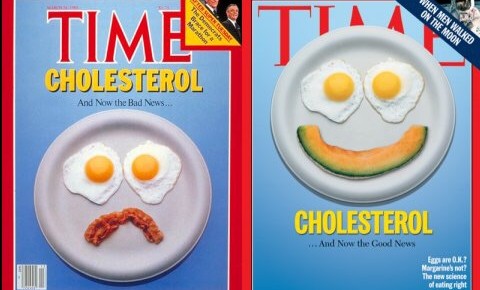
On New Year’s Eve we had the pleasure of entertaining many of our closest friends and family members, quite a few who stayed and crashed at our place. Upon awaken, the obvious answer to the question “what’s for breakfast?” was eggs.
You see, I like eggs and tend to eat a lot of them. I mean, who doesn’t love a good omelet, right?
Now, I’m sure you’ve heard a time or two before that you should be mindful of consuming too many eggs as their cholesterol content is rather high.
I’ve even heard the recommendation that eggs should only be eaten once per week to avoid cholesterol issues. If that’s the case, I’m probably due to die rather soon.
Fortunately, it’s not.
You see, for years we have been told that cholesterol intake should be kept to a bare minimum as doing so will help to decrease blood cholesterol levels and promote overall health, and although the theory of lowering dietary cholesterol intake to lower internal cholesterol makes logical sense, the theory doesn’t quite pan out, as our bodies are, generally, more complex creatures than our logical minds give them credit for.
Fact is, when dietary intake of cholesterol is decreased, the liver compensates by producing more cholesterol, leaving total cholesterol levels relatively unchanged. In the same way, if cholesterol consumption is increased, the liver produces less cholesterol, and again, total cholesterol values will not be substantially altered.
Now that’s not to say that we should go hog wild with our intake of cholesterol, but it does mean that one can expect cholesterol levels to remain relatively stable over a wide range of dietary intakes.
Given this information, you may be wondering why the body would ever produce more cholesterol if cholesterol is so “bad”, and that’s a good question.
The truth is, cholesterol actually acts as an antioxidant against dangerous free radicals within the blood and is also necessary for the production of certain hormones that help to fight against heart disease.
When there are high levels of undesirable substances in the blood (caused by the dietary intake of damaged fats, highly processed “unhealthy” foods, and large quantities of sugars), cholesterol levels rise in order to combat these substances.
Blaming heart disease on high cholesterol is like blaming infection on high levels of antibodies (special proteins produced by the body in order to defend against foreign bacteria and infectious agents). If the body allowed cholesterol to fall in the presence of large amounts of free radicals, our risk for heart disease would increase, not decrease, and fortunately our bodies won’t let that happen.
So, the answer to decreasing blood cholesterol levels is not avoiding omelets and not necessarily decreasing dietary cholesterol intake, but rather improving ones diet overall by eating healthier in general and avoiding the other harmful types of foods mentioned.
Combine that with increased physical activity and both you and your cholesterol levels will be in even better shape.
Keeping my eye on you in health and fitness,
Mark Lani CPT, CSN
Certified Personal Trainer
Certified Sports Nutritionist
